Qualitative Research Appraisal: Healthcare Providers' Study
VerifiedAdded on 2023/02/02
|9
|1988
|94
Report
AI Summary
This report presents a critical evaluation of a qualitative research article by Breen et al. (2018), focusing on healthcare providers' perceptions and experiences in caring for children with medical complexity (CMC). The report analyzes the aims, theoretical frameworks, research questions, methodology, data collection methods, data analysis techniques, main findings, and conclusions of the study. It identifies strengths such as the use of a mixed-methods approach and the study's relevance to improving healthcare systems. Weaknesses, such as limitations in data transcription and potential biases, are also discussed. The evaluation includes an assessment of the article's adequacy, highlighting the importance of integrated care models and the challenges faced by healthcare providers. The report concludes with reflections on the learning outcomes from the research, emphasizing the significance of the study for future research and practical applications in healthcare settings.
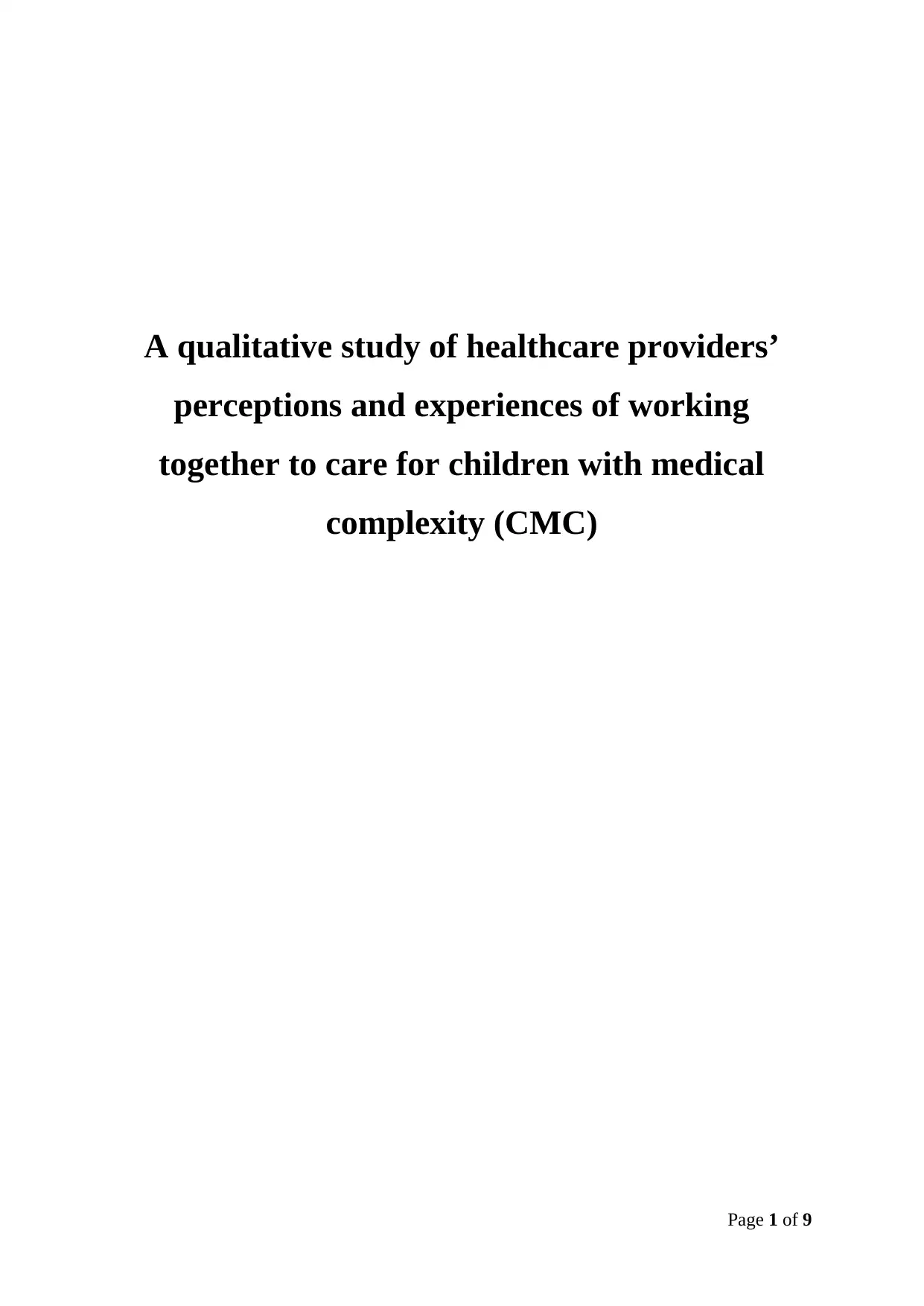
A qualitative study of healthcare providers’
perceptions and experiences of working
together to care for children with medical
complexity (CMC)
Page 1 of 9
perceptions and experiences of working
together to care for children with medical
complexity (CMC)
Page 1 of 9
Paraphrase This Document
Need a fresh take? Get an instant paraphrase of this document with our AI Paraphraser

Table of contents:
PART A......................................................................................................................................3
References................................................................................................................................10
Page 2 of 9
PART A......................................................................................................................................3
References................................................................................................................................10
Page 2 of 9
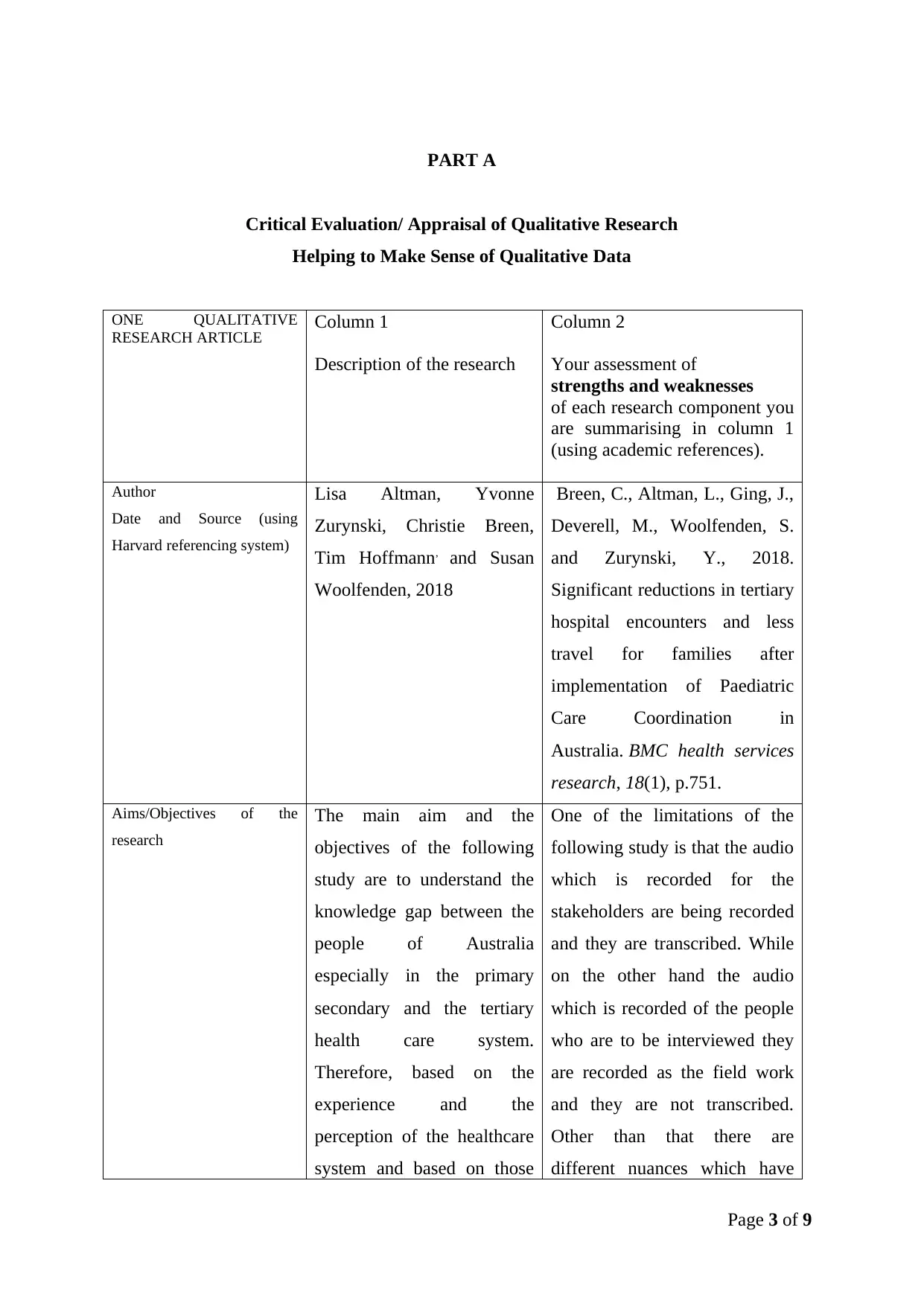
PART A
Critical Evaluation/ Appraisal of Qualitative Research
Helping to Make Sense of Qualitative Data
ONE QUALITATIVE
RESEARCH ARTICLE Column 1
Description of the research
Column 2
Your assessment of
strengths and weaknesses
of each research component you
are summarising in column 1
(using academic references).
Author
Date and Source (using
Harvard referencing system)
Lisa Altman, Yvonne
Zurynski, Christie Breen,
Tim Hoffmann, and Susan
Woolfenden, 2018
Breen, C., Altman, L., Ging, J.,
Deverell, M., Woolfenden, S.
and Zurynski, Y., 2018.
Significant reductions in tertiary
hospital encounters and less
travel for families after
implementation of Paediatric
Care Coordination in
Australia. BMC health services
research, 18(1), p.751.
Aims/Objectives of the
research
The main aim and the
objectives of the following
study are to understand the
knowledge gap between the
people of Australia
especially in the primary
secondary and the tertiary
health care system.
Therefore, based on the
experience and the
perception of the healthcare
system and based on those
One of the limitations of the
following study is that the audio
which is recorded for the
stakeholders are being recorded
and they are transcribed. While
on the other hand the audio
which is recorded of the people
who are to be interviewed they
are recorded as the field work
and they are not transcribed.
Other than that there are
different nuances which have
Page 3 of 9
Critical Evaluation/ Appraisal of Qualitative Research
Helping to Make Sense of Qualitative Data
ONE QUALITATIVE
RESEARCH ARTICLE Column 1
Description of the research
Column 2
Your assessment of
strengths and weaknesses
of each research component you
are summarising in column 1
(using academic references).
Author
Date and Source (using
Harvard referencing system)
Lisa Altman, Yvonne
Zurynski, Christie Breen,
Tim Hoffmann, and Susan
Woolfenden, 2018
Breen, C., Altman, L., Ging, J.,
Deverell, M., Woolfenden, S.
and Zurynski, Y., 2018.
Significant reductions in tertiary
hospital encounters and less
travel for families after
implementation of Paediatric
Care Coordination in
Australia. BMC health services
research, 18(1), p.751.
Aims/Objectives of the
research
The main aim and the
objectives of the following
study are to understand the
knowledge gap between the
people of Australia
especially in the primary
secondary and the tertiary
health care system.
Therefore, based on the
experience and the
perception of the healthcare
system and based on those
One of the limitations of the
following study is that the audio
which is recorded for the
stakeholders are being recorded
and they are transcribed. While
on the other hand the audio
which is recorded of the people
who are to be interviewed they
are recorded as the field work
and they are not transcribed.
Other than that there are
different nuances which have
Page 3 of 9
⊘ This is a preview!⊘
Do you want full access?
Subscribe today to unlock all pages.

Trusted by 1+ million students worldwide
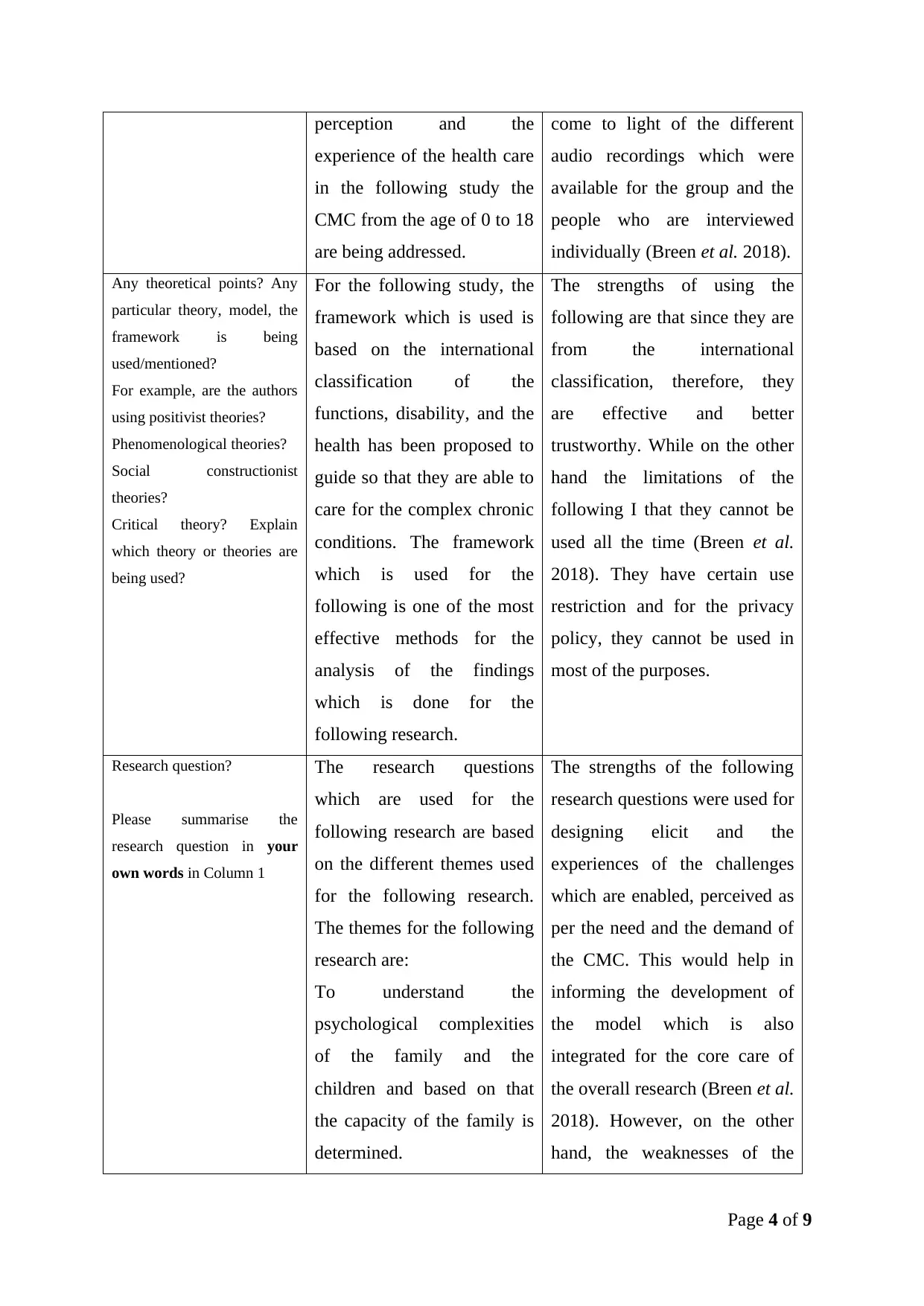
perception and the
experience of the health care
in the following study the
CMC from the age of 0 to 18
are being addressed.
come to light of the different
audio recordings which were
available for the group and the
people who are interviewed
individually (Breen et al. 2018).
Any theoretical points? Any
particular theory, model, the
framework is being
used/mentioned?
For example, are the authors
using positivist theories?
Phenomenological theories?
Social constructionist
theories?
Critical theory? Explain
which theory or theories are
being used?
For the following study, the
framework which is used is
based on the international
classification of the
functions, disability, and the
health has been proposed to
guide so that they are able to
care for the complex chronic
conditions. The framework
which is used for the
following is one of the most
effective methods for the
analysis of the findings
which is done for the
following research.
The strengths of using the
following are that since they are
from the international
classification, therefore, they
are effective and better
trustworthy. While on the other
hand the limitations of the
following I that they cannot be
used all the time (Breen et al.
2018). They have certain use
restriction and for the privacy
policy, they cannot be used in
most of the purposes.
Research question?
Please summarise the
research question in your
own words in Column 1
The research questions
which are used for the
following research are based
on the different themes used
for the following research.
The themes for the following
research are:
To understand the
psychological complexities
of the family and the
children and based on that
the capacity of the family is
determined.
The strengths of the following
research questions were used for
designing elicit and the
experiences of the challenges
which are enabled, perceived as
per the need and the demand of
the CMC. This would help in
informing the development of
the model which is also
integrated for the core care of
the overall research (Breen et al.
2018). However, on the other
hand, the weaknesses of the
Page 4 of 9
experience of the health care
in the following study the
CMC from the age of 0 to 18
are being addressed.
come to light of the different
audio recordings which were
available for the group and the
people who are interviewed
individually (Breen et al. 2018).
Any theoretical points? Any
particular theory, model, the
framework is being
used/mentioned?
For example, are the authors
using positivist theories?
Phenomenological theories?
Social constructionist
theories?
Critical theory? Explain
which theory or theories are
being used?
For the following study, the
framework which is used is
based on the international
classification of the
functions, disability, and the
health has been proposed to
guide so that they are able to
care for the complex chronic
conditions. The framework
which is used for the
following is one of the most
effective methods for the
analysis of the findings
which is done for the
following research.
The strengths of using the
following are that since they are
from the international
classification, therefore, they
are effective and better
trustworthy. While on the other
hand the limitations of the
following I that they cannot be
used all the time (Breen et al.
2018). They have certain use
restriction and for the privacy
policy, they cannot be used in
most of the purposes.
Research question?
Please summarise the
research question in your
own words in Column 1
The research questions
which are used for the
following research are based
on the different themes used
for the following research.
The themes for the following
research are:
To understand the
psychological complexities
of the family and the
children and based on that
the capacity of the family is
determined.
The strengths of the following
research questions were used for
designing elicit and the
experiences of the challenges
which are enabled, perceived as
per the need and the demand of
the CMC. This would help in
informing the development of
the model which is also
integrated for the core care of
the overall research (Breen et al.
2018). However, on the other
hand, the weaknesses of the
Page 4 of 9
Paraphrase This Document
Need a fresh take? Get an instant paraphrase of this document with our AI Paraphraser
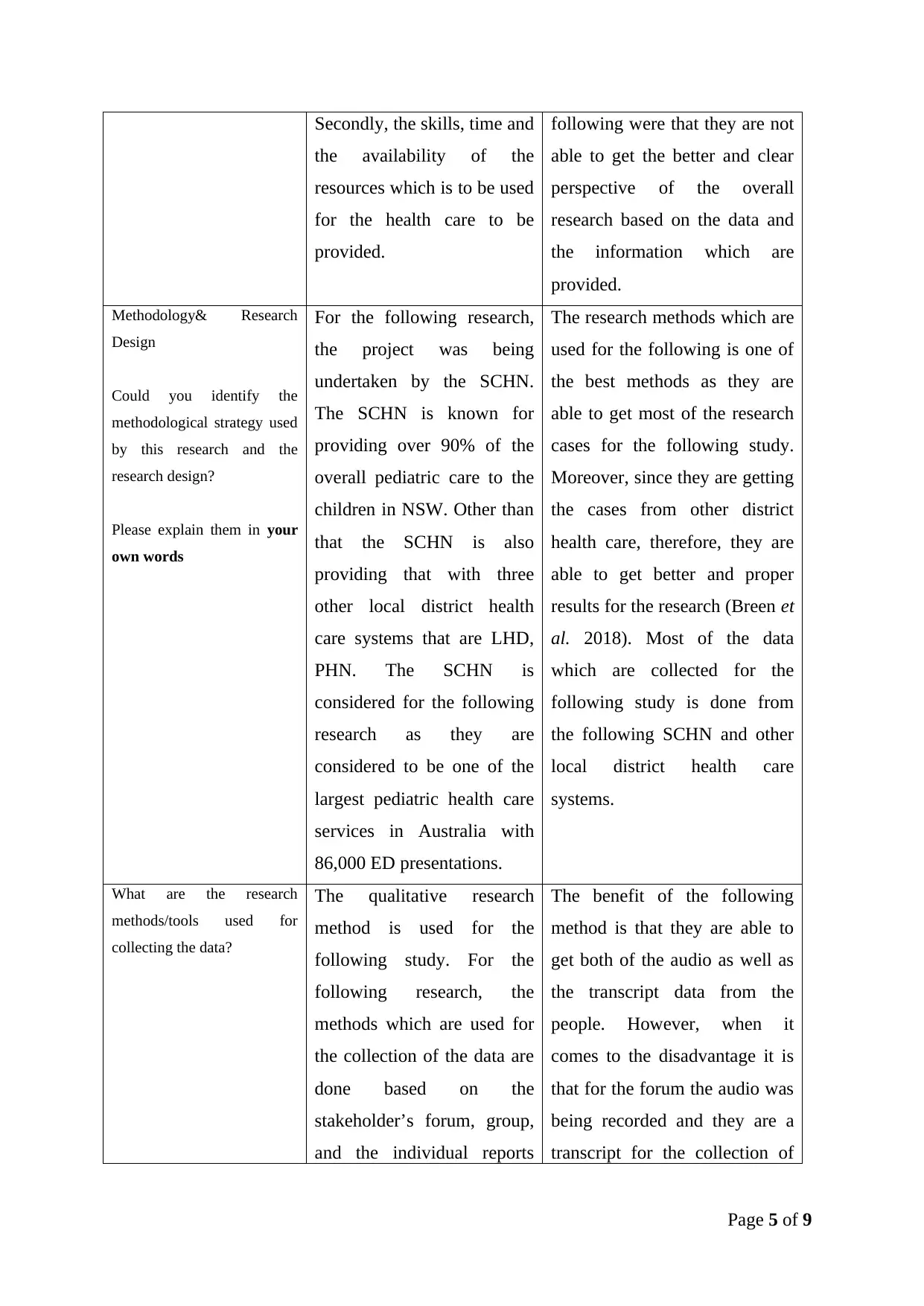
Secondly, the skills, time and
the availability of the
resources which is to be used
for the health care to be
provided.
following were that they are not
able to get the better and clear
perspective of the overall
research based on the data and
the information which are
provided.
Methodology& Research
Design
Could you identify the
methodological strategy used
by this research and the
research design?
Please explain them in your
own words
For the following research,
the project was being
undertaken by the SCHN.
The SCHN is known for
providing over 90% of the
overall pediatric care to the
children in NSW. Other than
that the SCHN is also
providing that with three
other local district health
care systems that are LHD,
PHN. The SCHN is
considered for the following
research as they are
considered to be one of the
largest pediatric health care
services in Australia with
86,000 ED presentations.
The research methods which are
used for the following is one of
the best methods as they are
able to get most of the research
cases for the following study.
Moreover, since they are getting
the cases from other district
health care, therefore, they are
able to get better and proper
results for the research (Breen et
al. 2018). Most of the data
which are collected for the
following study is done from
the following SCHN and other
local district health care
systems.
What are the research
methods/tools used for
collecting the data?
The qualitative research
method is used for the
following study. For the
following research, the
methods which are used for
the collection of the data are
done based on the
stakeholder’s forum, group,
and the individual reports
The benefit of the following
method is that they are able to
get both of the audio as well as
the transcript data from the
people. However, when it
comes to the disadvantage it is
that for the forum the audio was
being recorded and they are a
transcript for the collection of
Page 5 of 9
the availability of the
resources which is to be used
for the health care to be
provided.
following were that they are not
able to get the better and clear
perspective of the overall
research based on the data and
the information which are
provided.
Methodology& Research
Design
Could you identify the
methodological strategy used
by this research and the
research design?
Please explain them in your
own words
For the following research,
the project was being
undertaken by the SCHN.
The SCHN is known for
providing over 90% of the
overall pediatric care to the
children in NSW. Other than
that the SCHN is also
providing that with three
other local district health
care systems that are LHD,
PHN. The SCHN is
considered for the following
research as they are
considered to be one of the
largest pediatric health care
services in Australia with
86,000 ED presentations.
The research methods which are
used for the following is one of
the best methods as they are
able to get most of the research
cases for the following study.
Moreover, since they are getting
the cases from other district
health care, therefore, they are
able to get better and proper
results for the research (Breen et
al. 2018). Most of the data
which are collected for the
following study is done from
the following SCHN and other
local district health care
systems.
What are the research
methods/tools used for
collecting the data?
The qualitative research
method is used for the
following study. For the
following research, the
methods which are used for
the collection of the data are
done based on the
stakeholder’s forum, group,
and the individual reports
The benefit of the following
method is that they are able to
get both of the audio as well as
the transcript data from the
people. However, when it
comes to the disadvantage it is
that for the forum the audio was
being recorded and they are a
transcript for the collection of
Page 5 of 9
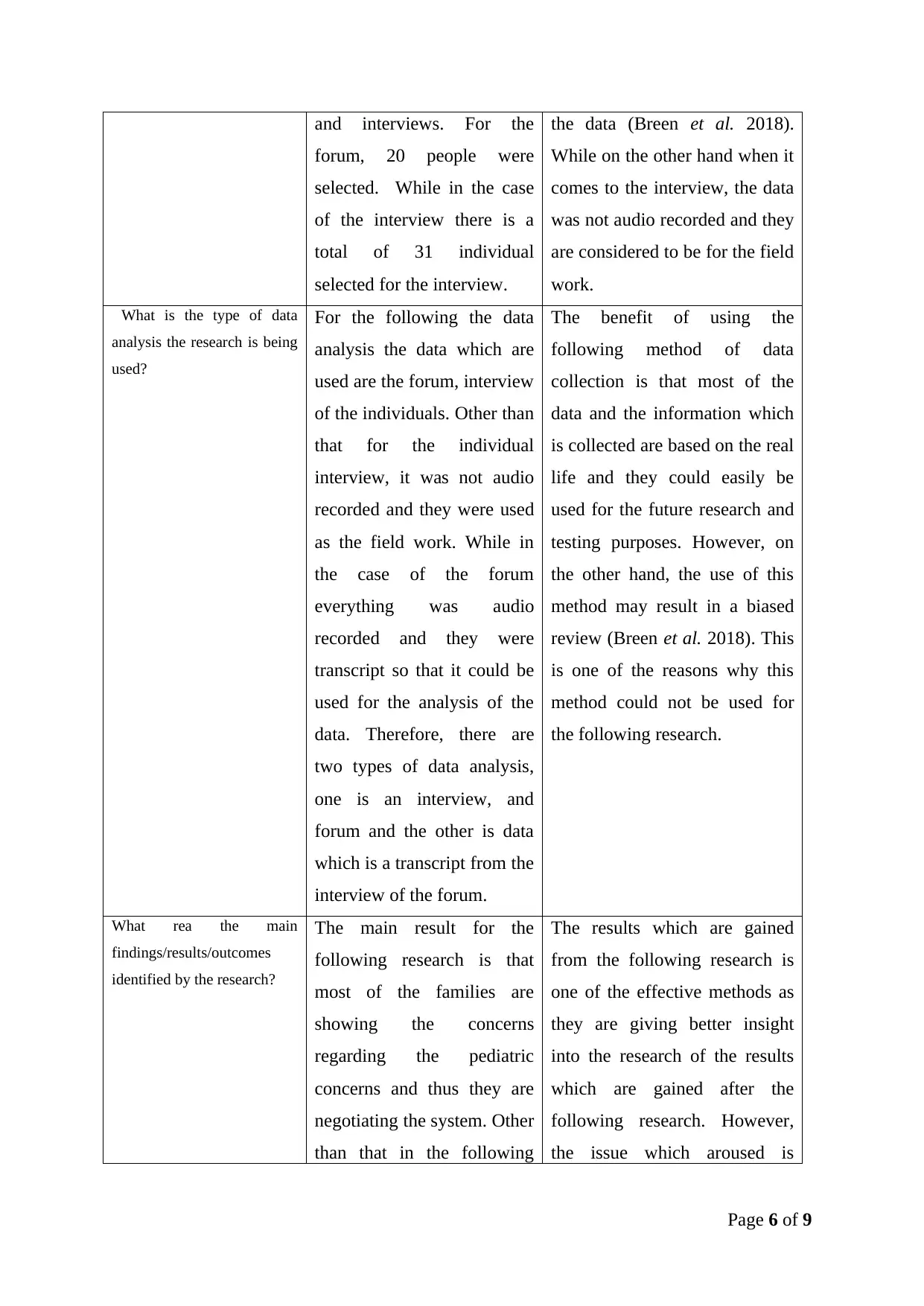
and interviews. For the
forum, 20 people were
selected. While in the case
of the interview there is a
total of 31 individual
selected for the interview.
the data (Breen et al. 2018).
While on the other hand when it
comes to the interview, the data
was not audio recorded and they
are considered to be for the field
work.
What is the type of data
analysis the research is being
used?
For the following the data
analysis the data which are
used are the forum, interview
of the individuals. Other than
that for the individual
interview, it was not audio
recorded and they were used
as the field work. While in
the case of the forum
everything was audio
recorded and they were
transcript so that it could be
used for the analysis of the
data. Therefore, there are
two types of data analysis,
one is an interview, and
forum and the other is data
which is a transcript from the
interview of the forum.
The benefit of using the
following method of data
collection is that most of the
data and the information which
is collected are based on the real
life and they could easily be
used for the future research and
testing purposes. However, on
the other hand, the use of this
method may result in a biased
review (Breen et al. 2018). This
is one of the reasons why this
method could not be used for
the following research.
What rea the main
findings/results/outcomes
identified by the research?
The main result for the
following research is that
most of the families are
showing the concerns
regarding the pediatric
concerns and thus they are
negotiating the system. Other
than that in the following
The results which are gained
from the following research is
one of the effective methods as
they are giving better insight
into the research of the results
which are gained after the
following research. However,
the issue which aroused is
Page 6 of 9
forum, 20 people were
selected. While in the case
of the interview there is a
total of 31 individual
selected for the interview.
the data (Breen et al. 2018).
While on the other hand when it
comes to the interview, the data
was not audio recorded and they
are considered to be for the field
work.
What is the type of data
analysis the research is being
used?
For the following the data
analysis the data which are
used are the forum, interview
of the individuals. Other than
that for the individual
interview, it was not audio
recorded and they were used
as the field work. While in
the case of the forum
everything was audio
recorded and they were
transcript so that it could be
used for the analysis of the
data. Therefore, there are
two types of data analysis,
one is an interview, and
forum and the other is data
which is a transcript from the
interview of the forum.
The benefit of using the
following method of data
collection is that most of the
data and the information which
is collected are based on the real
life and they could easily be
used for the future research and
testing purposes. However, on
the other hand, the use of this
method may result in a biased
review (Breen et al. 2018). This
is one of the reasons why this
method could not be used for
the following research.
What rea the main
findings/results/outcomes
identified by the research?
The main result for the
following research is that
most of the families are
showing the concerns
regarding the pediatric
concerns and thus they are
negotiating the system. Other
than that in the following
The results which are gained
from the following research is
one of the effective methods as
they are giving better insight
into the research of the results
which are gained after the
following research. However,
the issue which aroused is
Page 6 of 9
⊘ This is a preview!⊘
Do you want full access?
Subscribe today to unlock all pages.

Trusted by 1+ million students worldwide
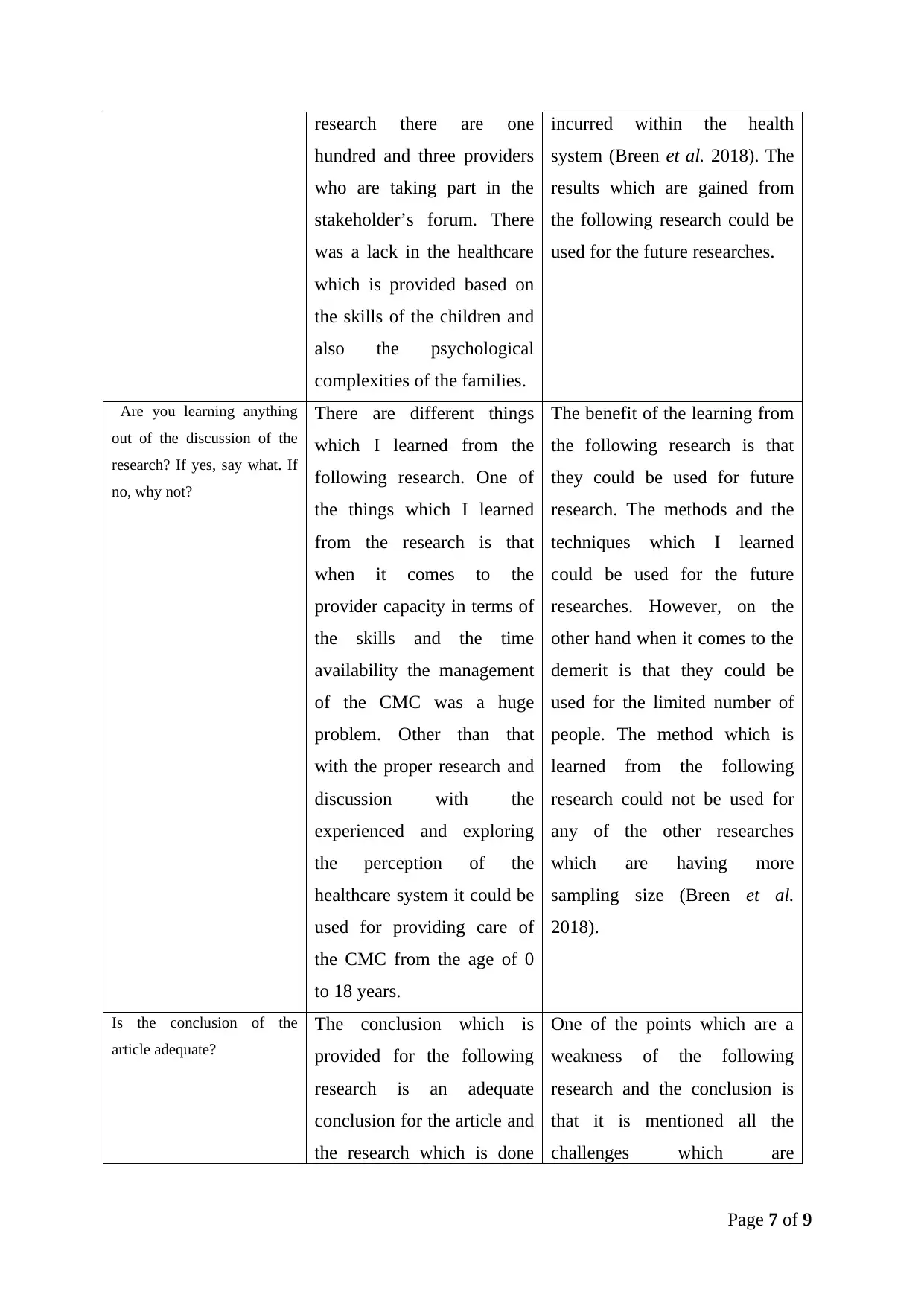
research there are one
hundred and three providers
who are taking part in the
stakeholder’s forum. There
was a lack in the healthcare
which is provided based on
the skills of the children and
also the psychological
complexities of the families.
incurred within the health
system (Breen et al. 2018). The
results which are gained from
the following research could be
used for the future researches.
Are you learning anything
out of the discussion of the
research? If yes, say what. If
no, why not?
There are different things
which I learned from the
following research. One of
the things which I learned
from the research is that
when it comes to the
provider capacity in terms of
the skills and the time
availability the management
of the CMC was a huge
problem. Other than that
with the proper research and
discussion with the
experienced and exploring
the perception of the
healthcare system it could be
used for providing care of
the CMC from the age of 0
to 18 years.
The benefit of the learning from
the following research is that
they could be used for future
research. The methods and the
techniques which I learned
could be used for the future
researches. However, on the
other hand when it comes to the
demerit is that they could be
used for the limited number of
people. The method which is
learned from the following
research could not be used for
any of the other researches
which are having more
sampling size (Breen et al.
2018).
Is the conclusion of the
article adequate?
The conclusion which is
provided for the following
research is an adequate
conclusion for the article and
the research which is done
One of the points which are a
weakness of the following
research and the conclusion is
that it is mentioned all the
challenges which are
Page 7 of 9
hundred and three providers
who are taking part in the
stakeholder’s forum. There
was a lack in the healthcare
which is provided based on
the skills of the children and
also the psychological
complexities of the families.
incurred within the health
system (Breen et al. 2018). The
results which are gained from
the following research could be
used for the future researches.
Are you learning anything
out of the discussion of the
research? If yes, say what. If
no, why not?
There are different things
which I learned from the
following research. One of
the things which I learned
from the research is that
when it comes to the
provider capacity in terms of
the skills and the time
availability the management
of the CMC was a huge
problem. Other than that
with the proper research and
discussion with the
experienced and exploring
the perception of the
healthcare system it could be
used for providing care of
the CMC from the age of 0
to 18 years.
The benefit of the learning from
the following research is that
they could be used for future
research. The methods and the
techniques which I learned
could be used for the future
researches. However, on the
other hand when it comes to the
demerit is that they could be
used for the limited number of
people. The method which is
learned from the following
research could not be used for
any of the other researches
which are having more
sampling size (Breen et al.
2018).
Is the conclusion of the
article adequate?
The conclusion which is
provided for the following
research is an adequate
conclusion for the article and
the research which is done
One of the points which are a
weakness of the following
research and the conclusion is
that it is mentioned all the
challenges which are
Page 7 of 9
Paraphrase This Document
Need a fresh take? Get an instant paraphrase of this document with our AI Paraphraser
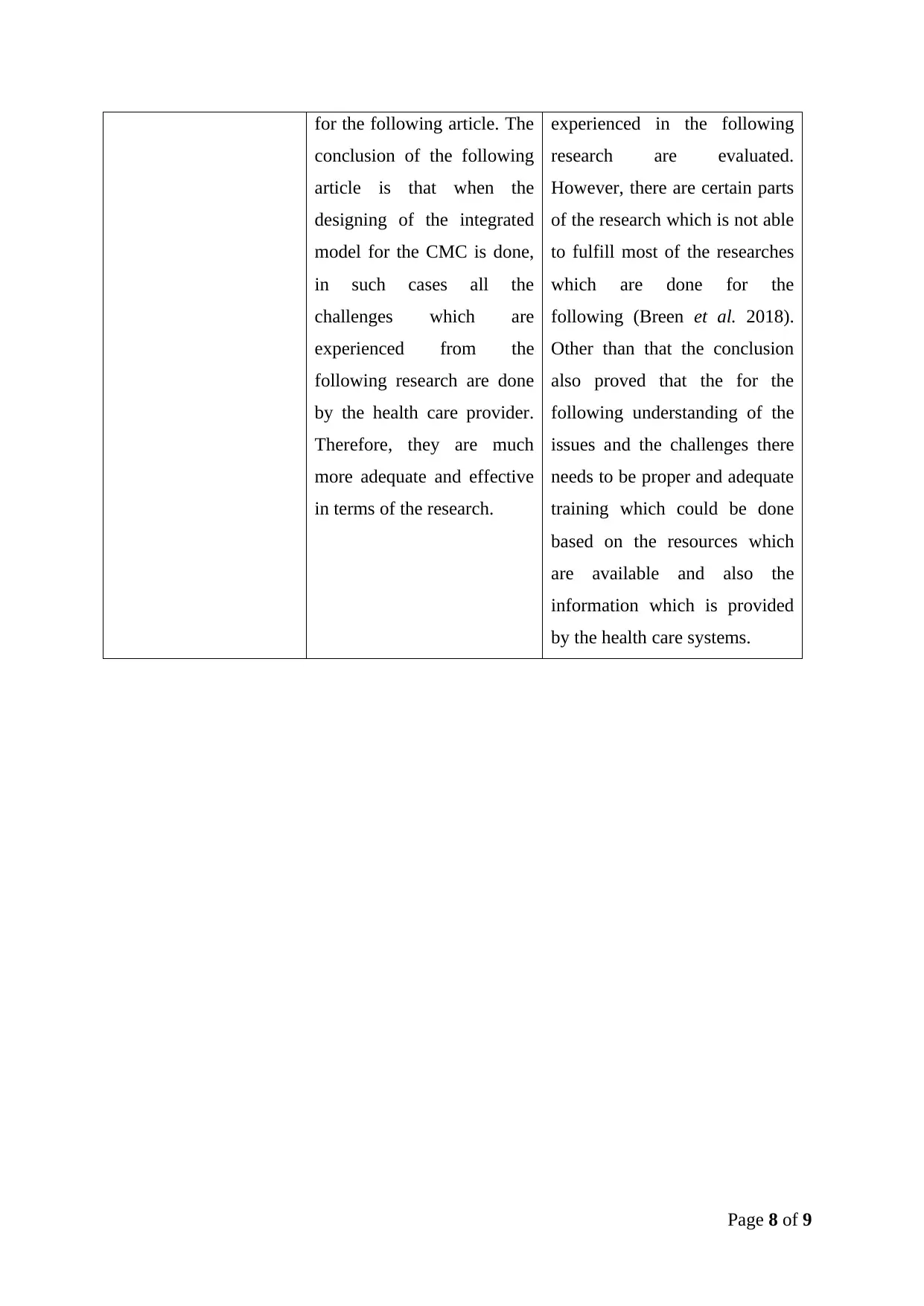
for the following article. The
conclusion of the following
article is that when the
designing of the integrated
model for the CMC is done,
in such cases all the
challenges which are
experienced from the
following research are done
by the health care provider.
Therefore, they are much
more adequate and effective
in terms of the research.
experienced in the following
research are evaluated.
However, there are certain parts
of the research which is not able
to fulfill most of the researches
which are done for the
following (Breen et al. 2018).
Other than that the conclusion
also proved that the for the
following understanding of the
issues and the challenges there
needs to be proper and adequate
training which could be done
based on the resources which
are available and also the
information which is provided
by the health care systems.
Page 8 of 9
conclusion of the following
article is that when the
designing of the integrated
model for the CMC is done,
in such cases all the
challenges which are
experienced from the
following research are done
by the health care provider.
Therefore, they are much
more adequate and effective
in terms of the research.
experienced in the following
research are evaluated.
However, there are certain parts
of the research which is not able
to fulfill most of the researches
which are done for the
following (Breen et al. 2018).
Other than that the conclusion
also proved that the for the
following understanding of the
issues and the challenges there
needs to be proper and adequate
training which could be done
based on the resources which
are available and also the
information which is provided
by the health care systems.
Page 8 of 9
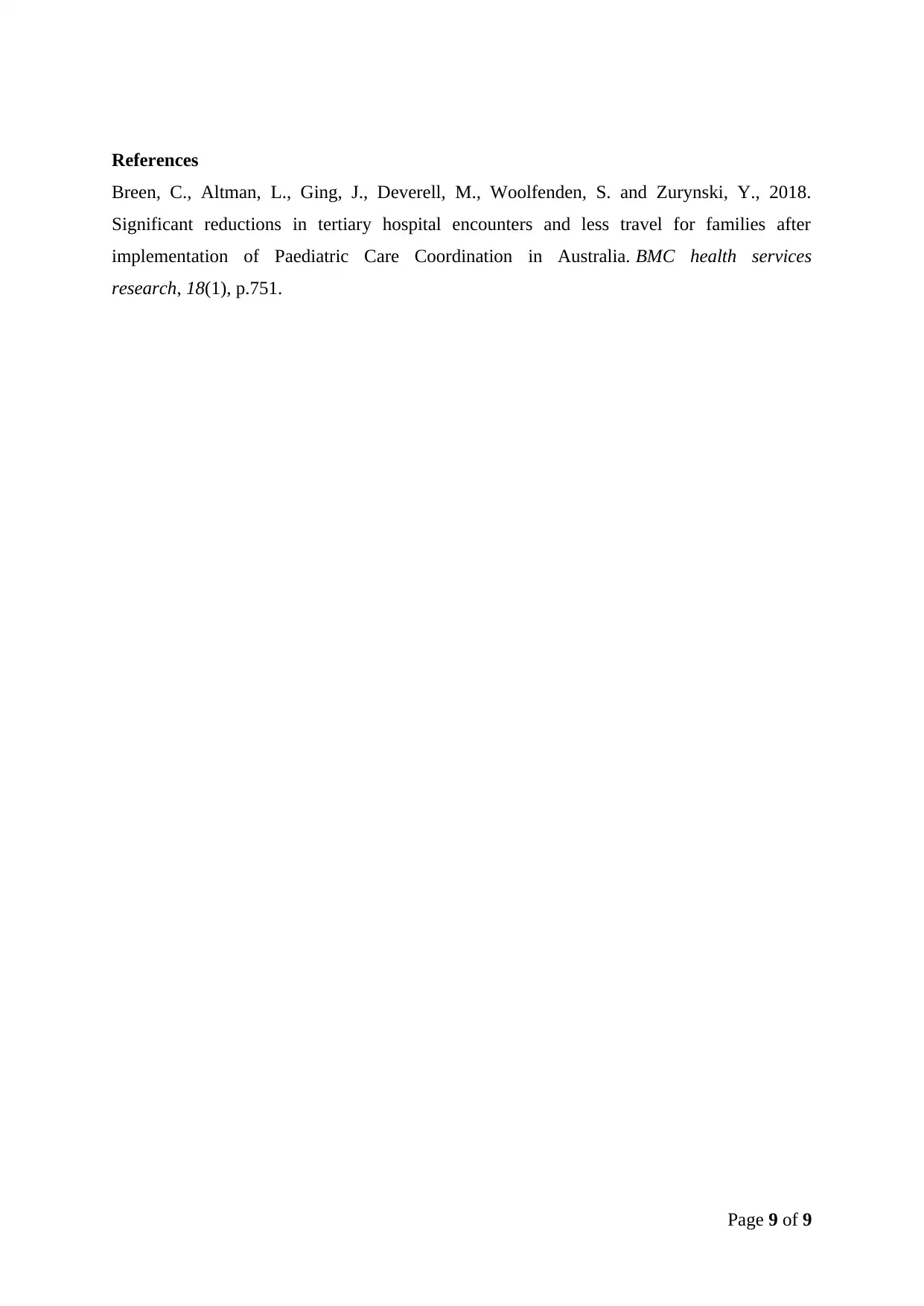
References
Breen, C., Altman, L., Ging, J., Deverell, M., Woolfenden, S. and Zurynski, Y., 2018.
Significant reductions in tertiary hospital encounters and less travel for families after
implementation of Paediatric Care Coordination in Australia. BMC health services
research, 18(1), p.751.
Page 9 of 9
Breen, C., Altman, L., Ging, J., Deverell, M., Woolfenden, S. and Zurynski, Y., 2018.
Significant reductions in tertiary hospital encounters and less travel for families after
implementation of Paediatric Care Coordination in Australia. BMC health services
research, 18(1), p.751.
Page 9 of 9
⊘ This is a preview!⊘
Do you want full access?
Subscribe today to unlock all pages.

Trusted by 1+ million students worldwide
1 out of 9
Related Documents
Your All-in-One AI-Powered Toolkit for Academic Success.
+13062052269
info@desklib.com
Available 24*7 on WhatsApp / Email
![[object Object]](/_next/static/media/star-bottom.7253800d.svg)
Unlock your academic potential
Copyright © 2020–2026 A2Z Services. All Rights Reserved. Developed and managed by ZUCOL.



